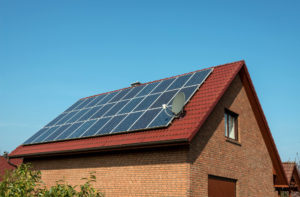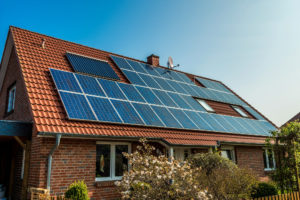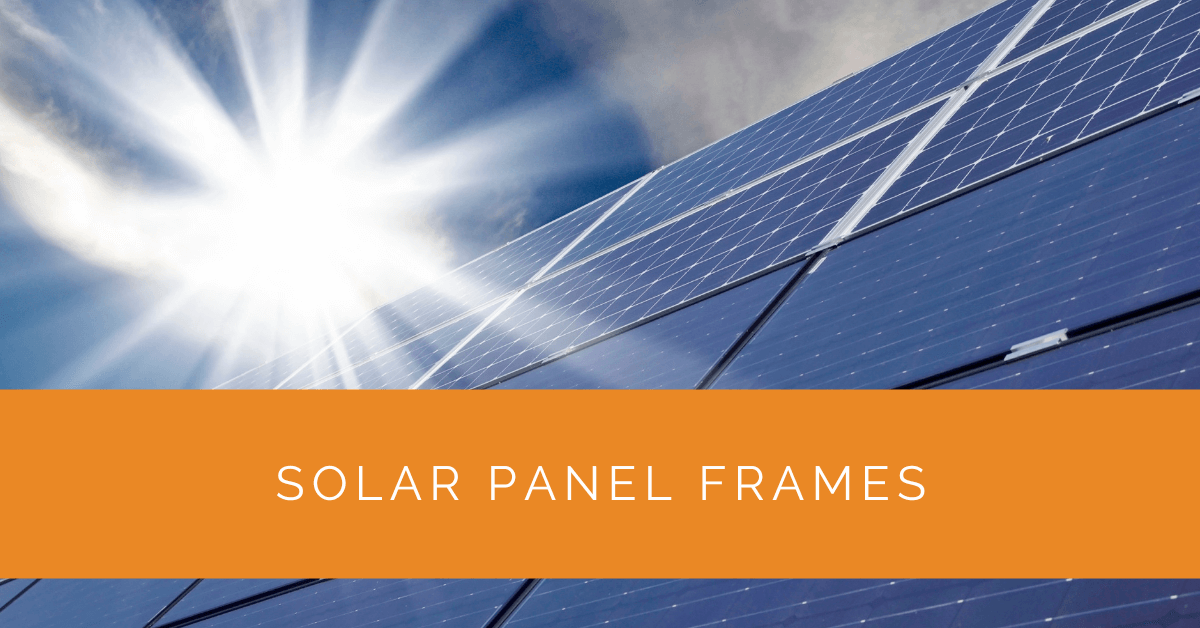Solar energy has become an increasingly popular and eco-friendly choice for power generation. One critical component of any solar panel system is the frame that supports the solar panels. This comprehensive guide will delve into the intricate world of solar panel frames, exploring their types, materials, designs, and mounting options. By the end of this article, you’ll have a deeper understanding of how solar panel frames work and how they contribute to the efficiency and durability of solar energy systems.
Contents
- 1 Key Takeaways
- 2 The Basics of Solar Panel Frames
- 3 Types of Solar Panel Frames
- 4 Solar Panel Frame Designs
- 5 Mounting Solar Panels
- 6 Solar Panel Frame Maintenance
- 7 Case Study: Enhancing Solar Efficiency with Customized Aluminum Frames
- 8 Expert Insights From Our Solar Panel Installers About Solar Panel Frames
- 9 Experience Solar Excellence with Us!
- 10 Conclusion
Key Takeaways
- Aluminum frames are the preferred choice for solar panels due to their lightweight, corrosion resistance, and customizability, enhancing efficiency and durability.
- Different frame designs, such as standard, origami, and corner brackets, offer various installation options, ensuring versatility in solar panel setups.
- Proper maintenance, including corrosion checks, stability assessments, and regular cleaning, is essential to maximize the lifespan and efficiency of solar panel frames and systems.
The Basics of Solar Panel Frames
Solar panel frames, also known as solar module frames, are the structural support systems that hold solar panels in place. These frames play a pivotal role in ensuring the longevity and performance of solar panels. Let’s start by understanding the fundamentals:
What is a Solar Panel Frame?
A solar panel frame is a specially designed structure made from aluminum, aluminum alloys, or steel. Its primary function is to hold solar panels securely in position, protecting them from external factors while optimizing their exposure to sunlight.
Materials Used for Solar Panel Frames
Aluminum Frames
Aluminum frames are the most common choice in the solar industry due to their exceptional characteristics. These frames are:
- Lightweight: Aluminum frames reduce the overall weight of the solar panel system, making installation and maintenance easier.
- Corrosion-Resistant: Aluminum’s natural corrosion resistance ensures the frame’s durability, even outdoors.
- Sturdy: Despite their lightweight nature, aluminum frames are incredibly strong, providing robust support to solar panels.
Steel Frames
While less common, steel frames are used when added strength and support are required. They are often used in heavy-duty ground-mounted solar panel systems.
Advantages of Aluminum Frames
Aluminum frames offer several advantages, making them a preferred choice for most solar panel installations:
- Corrosion Resistance: Aluminum frames are naturally corrosion-resistant, ensuring a longer lifespan for the solar panels.
- Lightweight: The lightweight nature of aluminum frames simplifies transportation and installation.
- Customization: Aluminum frames can be easily customized to fit specific solar panel sizes and designs.
- Reduction in Thickness: Aluminum frames are designed to minimize the thickness of the overall solar panel module, enhancing its efficiency.

Types of Solar Panel Frames
Now that we’ve covered the basics, let’s explore the various types of solar panel frames available:
Aluminum Solar Panel Frames
Aluminum solar panel frames are the go-to choice for most residential and commercial installations. They are known for their:
- Lightweight Construction: Aluminum frames are incredibly light, reducing the overall weight of the solar panel system.
- Durability: They are corrosion-resistant, ensuring a longer lifespan for the solar panels.
- Customization: Aluminum frames can be tailor-made to fit various solar panel sizes and shapes.
- Efficiency Boost: These frames contribute to the reduction in thickness of the solar module, enhancing its efficiency.
Custom Solar Panel Frames
Custom solar panel frames are designed to meet specific project requirements. Here’s why they are beneficial:
- Tailored Solutions: Custom frames are created to fit the precise dimensions and specifications of the solar panels.
- Efficiency Optimization: Customization allows for the most efficient positioning of solar panels, maximizing electricity production.
- Supply Chain Control: Custom frames offer greater control over the supply chain, reducing lead times and costs.
Solar Panel Frame Designs
The design of a solar panel frame can significantly impact its functionality and ease of installation. Let’s explore different frame designs:
Standard Solar Panel Frames
Standard frames are the most common choice. They are designed for easy installation on various surfaces, including rooftops and ground-mounted systems.
Origami Solar Panel Frames
Origami solar frames are a unique and innovative design inspired by the art of paper folding. They are known for their compactness and lightweight nature. Origami frames are often used in portable solar panels and battery-charging kits.
Corner Brackets
Corner brackets play a crucial role in frame stability. They reinforce the corners of the frame, ensuring that the solar panels remain securely in place, even in challenging weather conditions.

Mounting Solar Panels
Now that you have an understanding of the different types and designs of solar panel frames let’s explore the mounting options:
Roof Mounting
Roof-mounted solar panels are a popular choice for residential and commercial installations. Here’s what you need to know:
- Efficient Use of Space: Roof-mounted systems use available rooftop space efficiently.
- Specialized Roof Mounting Kits: Specialized kits are available for securing solar panels to various roof types, ensuring a secure and leak-free installation.
Ground Mounting
Ground-mounted solar panels are commonly used in larger installations. Consider the following:
- Sturdy Frames for Ground Installations: Ground-mounted systems require sturdy frames to withstand outdoor conditions and ensure the stability of solar panels.
- Outdoor Considerations: Ground-mounted systems should be designed to withstand exposure to the elements, and additional protective measures may be necessary.
- Battery Storage Options: Ground-mounted systems often have space for battery storage, making them suitable for off-grid applications.
Solar Panel Frame Maintenance
Regular maintenance is essential to ensure the longevity and efficiency of your solar panel frame. Here are some maintenance tips:
- Corrosion Inspection: Periodically inspect the frame for any signs of corrosion, especially in regions with high humidity or salt exposure.
- Stability Check: Ensure the frame remains stable and securely holds the solar panels.
- Cleaning: Remove dirt and debris from the frame and solar panels to optimize sunlight absorption.
- Battery Maintenance: If your system includes battery storage, follow manufacturer guidelines for battery maintenance.
Case Study: Enhancing Solar Efficiency with Customized Aluminum Frames
Background
At Solar Panels Network USA, we pride ourselves on delivering tailored solar solutions that maximize efficiency and sustainability. One of our recent projects involved a commercial client seeking to optimize their rooftop solar installation. The client’s primary goals were to maximize energy output, ensure long-term durability, and maintain aesthetic appeal.
Project Overview
The client’s facility had a unique rooftop structure with varying elevations and limited space. Standard solar panel frames would not suffice due to the need for precise alignment and optimal sunlight exposure. We proposed using customized aluminum frames to address these challenges and enhance the overall performance of the solar installation.
Implementation
Site Assessment:
We conducted a comprehensive site assessment to evaluate the rooftop’s structural integrity, sunlight exposure, and potential shading issues. This assessment was crucial in designing a customized frame solution tailored to the specific conditions of the site.
Frame Design:
Utilizing our expertise in solar technology and structural engineering, we designed custom aluminum frames. These frames were engineered to fit the unique dimensions and angles of the rooftop, ensuring optimal alignment of the solar panels. The design incorporated origami-inspired elements to enhance flexibility and reduce material usage without compromising strength.
Installation Process:
The installation process began with securing the custom frames to the rooftop using specialized mounting kits. The lightweight nature of the aluminum frames simplified the installation, reducing labor costs and time. Each solar panel was meticulously aligned and secured to the frames, ensuring maximum exposure to sunlight throughout the day.
Maintenance Plan:
To ensure the longevity and efficiency of the solar panel system, we developed a detailed maintenance plan. This included regular inspections for corrosion, stability checks, and cleaning schedules. The client was provided with a comprehensive guide on maintaining the frames and panels, emphasizing the importance of proactive care.
Results
Increased Efficiency:
The customized aluminum frames significantly improved the alignment and exposure of the solar panels, resulting in a 15% increase in energy output compared to initial estimates. The lightweight and corrosion-resistant properties of the frames contributed to maintaining optimal performance.
Cost-Effective Solution:
The use of customized frames eliminated the need for extensive rooftop modifications, saving the client substantial costs. The efficient installation process further reduced labor expenses, making the overall project highly cost-effective.
Enhanced Durability:
The aluminum frames’ resistance to corrosion and environmental factors ensured the system’s durability. Regular maintenance checks revealed no significant issues, and the client reported consistent performance since installation.
Aesthetic Appeal:
The custom frames were designed to blend seamlessly with the rooftop, maintaining the facility’s aesthetic appeal. The sleek design of the frames added a modern touch to the building, aligning with the client’s branding and architectural preferences.
Summary
Our experience with this commercial project highlights the significant benefits of using customized aluminum frames in solar panel installations. By tailoring the frame design to the specific needs of the site, we achieved enhanced efficiency, cost savings, and long-term durability. At Solar Panels Network USA, we continue to leverage our expertise to provide innovative and sustainable solar solutions that meet our clients’ unique requirements. Whether for residential or commercial applications, our customized frame solutions ensure the optimal performance and longevity of solar energy systems.
Expert Insights From Our Solar Panel Installers About Solar Panel Frames
Aluminum frames are the backbone of modern solar panel systems. Their lightweight nature and corrosion resistance make them ideal for both residential and commercial installations, ensuring long-term durability and efficiency.
Senior Solar Engineer
Custom solar panel frames offer unparalleled flexibility, allowing us to optimize the panel’s orientation and maximize energy production. Tailoring the frame design to specific project requirements ensures the best possible performance.
Lead Solar Technician
Proper maintenance of solar panel frames, including regular inspections for corrosion and stability, is crucial. This proactive approach ensures the longevity of the system and prevents potential performance issues.
Solar Maintenance Specialist
Experience Solar Excellence with Us!
Trust in Solar Panels Network USA, where our seasoned experts deliver top-quality solar solutions for homes and businesses nationwide. With a legacy of countless successful installations and a commitment to sustainable energy, we’re your reliable partner in the solar journey. Ready for a brighter, eco-friendly future? Call us now at (855) 427-0058 and harness the power of the sun!
Conclusion
Understanding solar panel frames is crucial for anyone considering a solar energy system. The choice of frame material, design, and mounting method can significantly impact the performance and durability of the system. Whether you opt for lightweight aluminum frames or require custom solutions, your solar panel frame is vital in harnessing clean, renewable energy. Protecting and optimizing your solar panels can contribute to a greener and more sustainable future.
About the Author
Solar Panels Network USA stands at the forefront of solar energy solutions, driven by a team of seasoned solar engineers and energy consultants. With over decades of experience in delivering high-quality solar installations and maintenance, we are committed to promoting sustainable energy through customer-centric, tailored solutions. Our articles reflect this commitment, crafted collaboratively by experts to provide accurate, up-to-date insights into solar technology, ensuring our readers are well-informed and empowered in their solar energy decisions.

